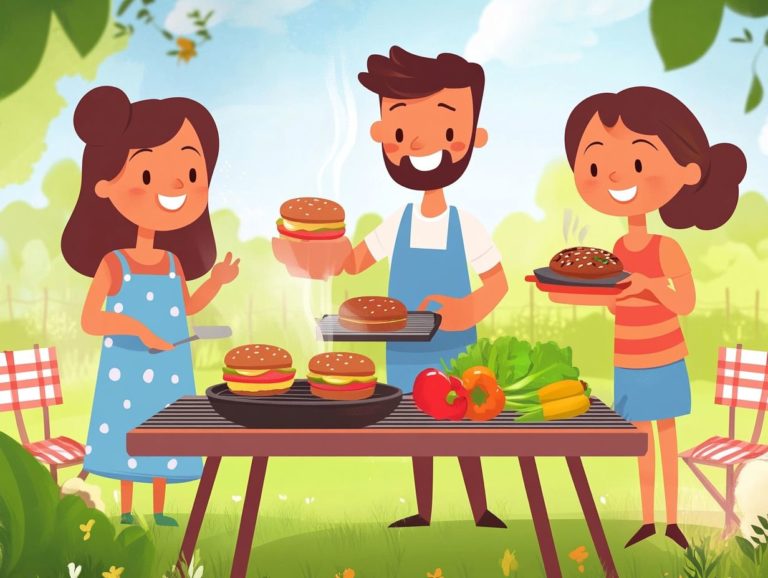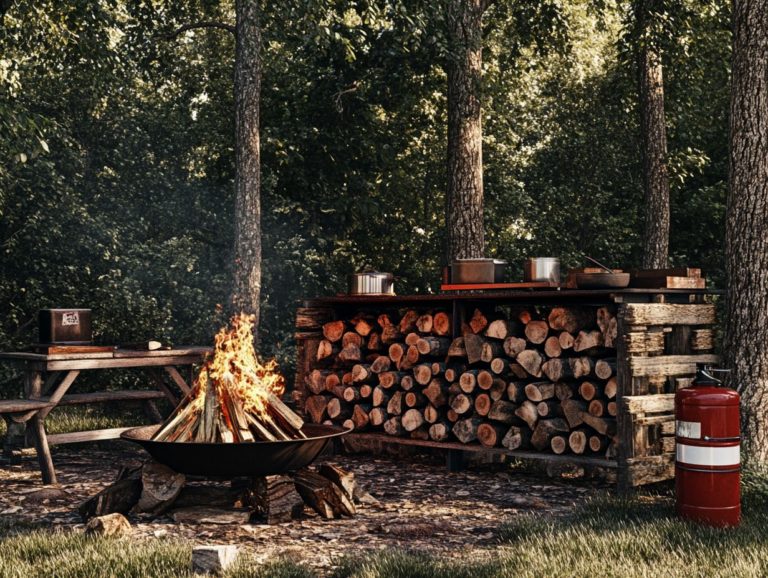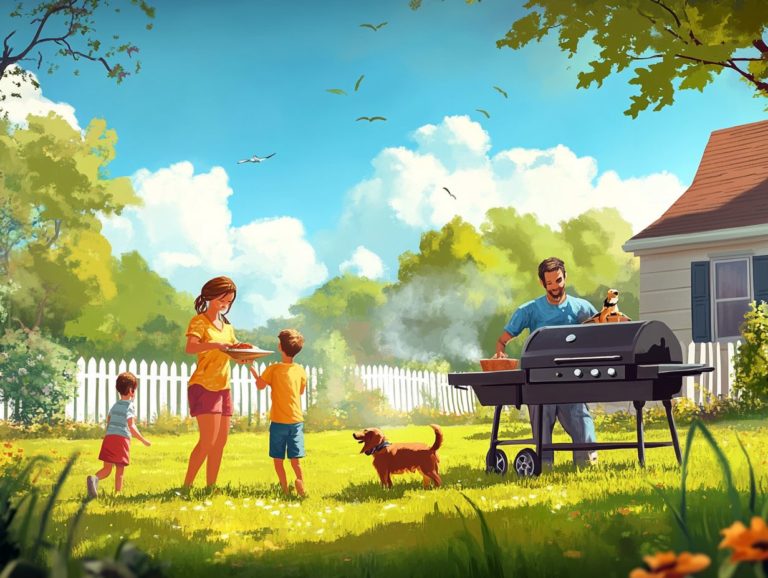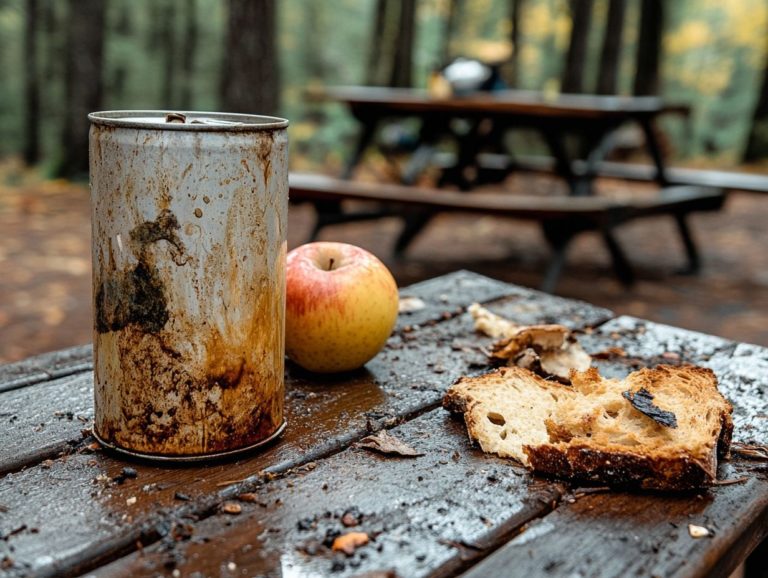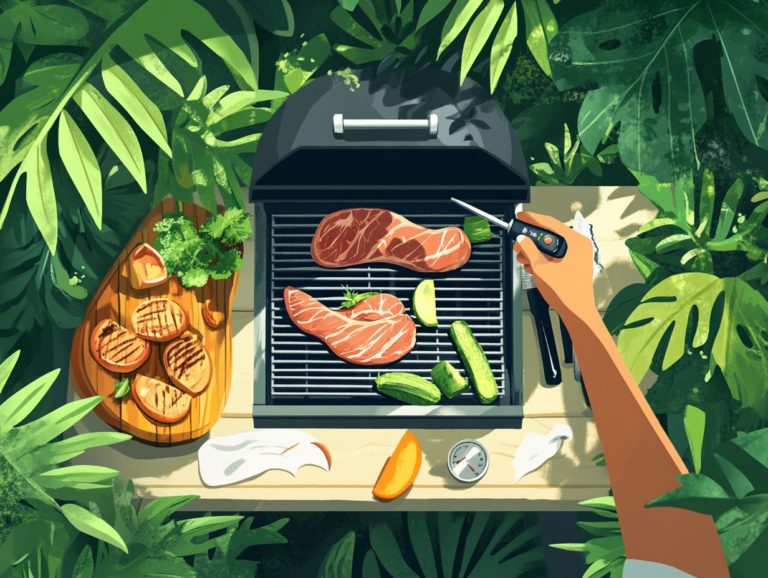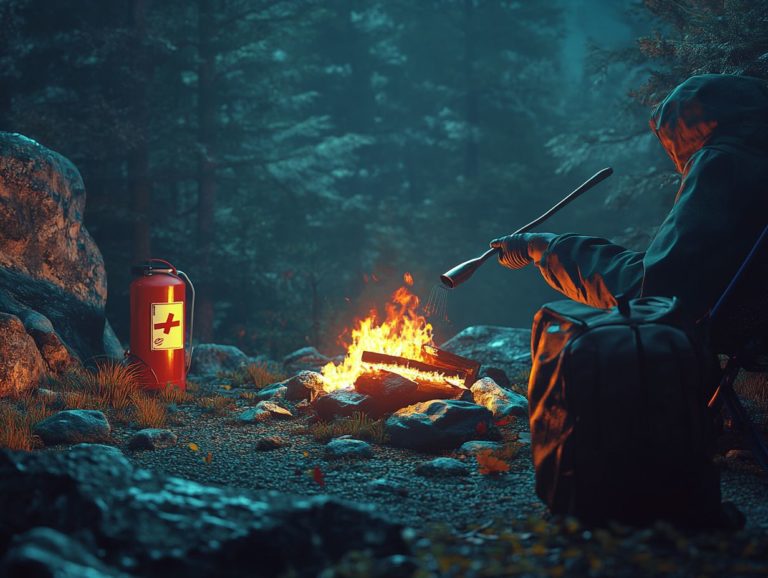What to Do in Case of an Outdoor Cooking Accident
Outdoor cooking is thrilling! It offers a wonderful opportunity to savor meals amidst nature, but it also comes with unique risks, including potential kitchen injuries.
Accidents can occur when you least expect them, ranging from minor burns to more serious injuries. This article explores common mishaps associated with outdoor cooking, such as getting sick from spoiled food and accidental injuries, examining their causes and outlining immediate steps to take if something goes wrong.
You ll also find essential tips on prevention and proper care, ensuring you can fully enjoy your outdoor cooking experiences without worry. Stay informed and prepared for any eventuality!
Contents
- Key Takeaways:
- Watch Out for these Outdoor Cooking Accidents!
- First Aid for Outdoor Cooking Accidents
- Preventing Outdoor Cooking Accidents
- Dealing with Burns and Other Injuries
- When to Seek Medical Attention
- Frequently Asked Questions
- What should I do if I accidentally start a fire while cooking outdoors?
- What safety precautions should I take when cooking outdoors?
- What should I do if someone gets burned while cooking outdoors?
- How can I prevent accidents while cooking outdoors?
- What are common symptoms of heat exhaustion?
- What should I do if I run out of propane while cooking outdoors?
- What should I do if I accidentally cut myself while cooking outdoors?
Key Takeaways:
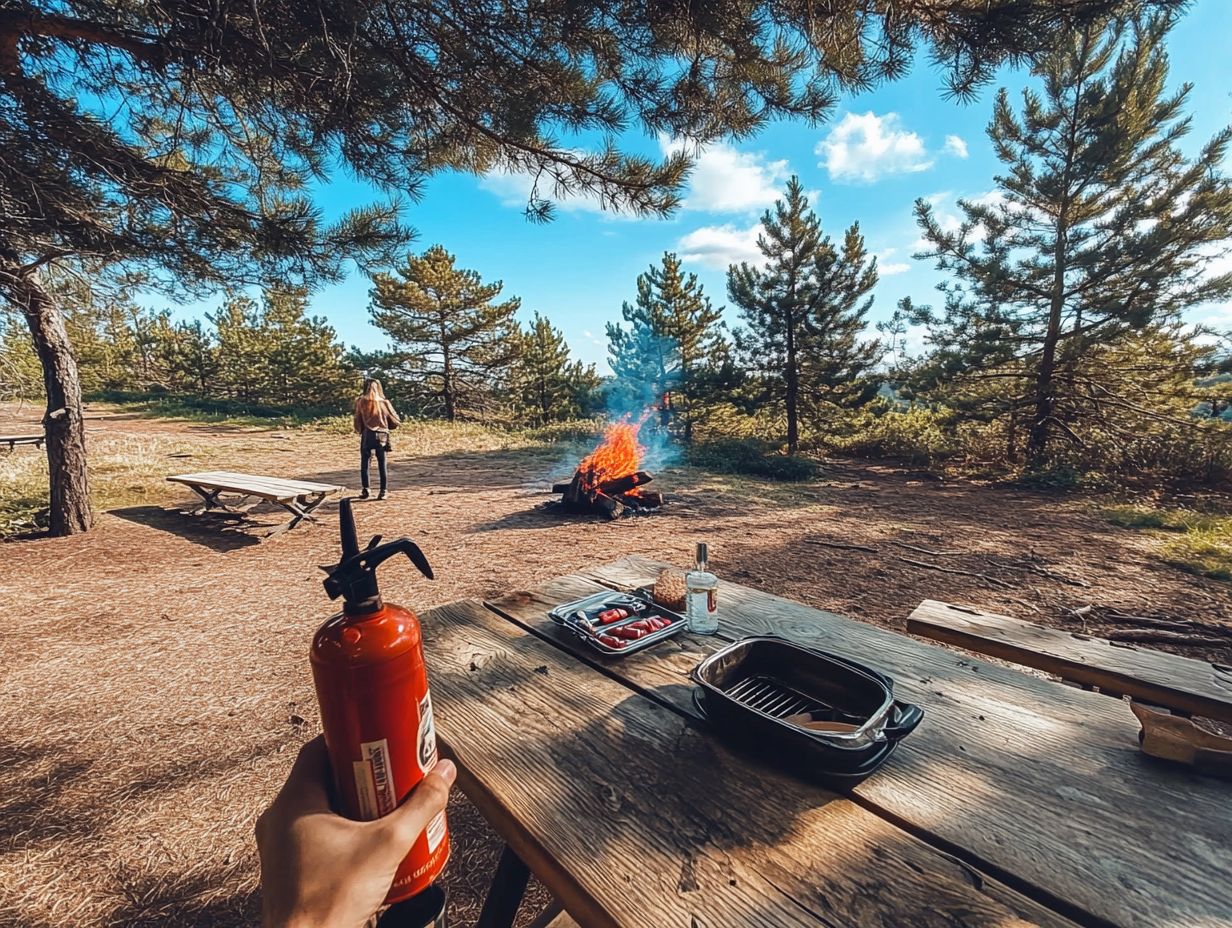
Watch Out for these Outdoor Cooking Accidents!
Outdoor cooking offers a delightful experience while carrying its own array of risks and potential kitchen injuries that can escalate into serious accidents. Whether it s burns from sizzling grease or cuts from sharp utensils, these mishaps can happen in an instant, especially during the summer months when grilling and camp cooking are popular.
Recognizing common accidents is essential for creating a safe space, especially for children who may not understand the dangers around them.
Types and Causes of Accidents
Accidents during outdoor cooking can range from minor injuries to life-threatening events, so being aware is vital for your safety. Common mishaps include burns from hot grease, knife cuts while handling sharp tools, and foodborne illnesses due to improper food handling.
It s important to understand these risks, especially when children are involved; they may not realize the potential dangers.
For instance, grease burns can easily happen when hot oil splatters, leading to painful skin injuries that require immediate care. Knife cuts often occur when chopping ingredients without the right technique or focus, potentially resulting in severe lacerations.
In the United States alone, nearly 48 million people suffer from foodborne illnesses each year, highlighting the importance of proper hygiene practices. By using separate utensils for raw and cooked foods and ensuring thorough hand washing, you can significantly reduce the risk of getting sick from spoiled food.
Ultimately, staying vigilant and informed about these kitchen hazards will help you create a safer and more enjoyable outdoor cooking experience.
First Aid for Outdoor Cooking Accidents
When outdoor cooking accidents happen, your ability to provide immediate first aid can greatly impact the outcome, minimizing damage and enhancing safety. Knowing how to respond swiftly is crucial for kitchen injuries such as burns, cuts, or food contamination.
This might mean using an ice pack for burns, applying Neosporin to cuts to prevent infection, and recognizing the need for a vaccine if you have a deep cut or a trip to the emergency room.
Being equipped with first aid knowledge not only alleviates the severity of injuries but also fosters a quicker recovery.
Immediate Actions to Take
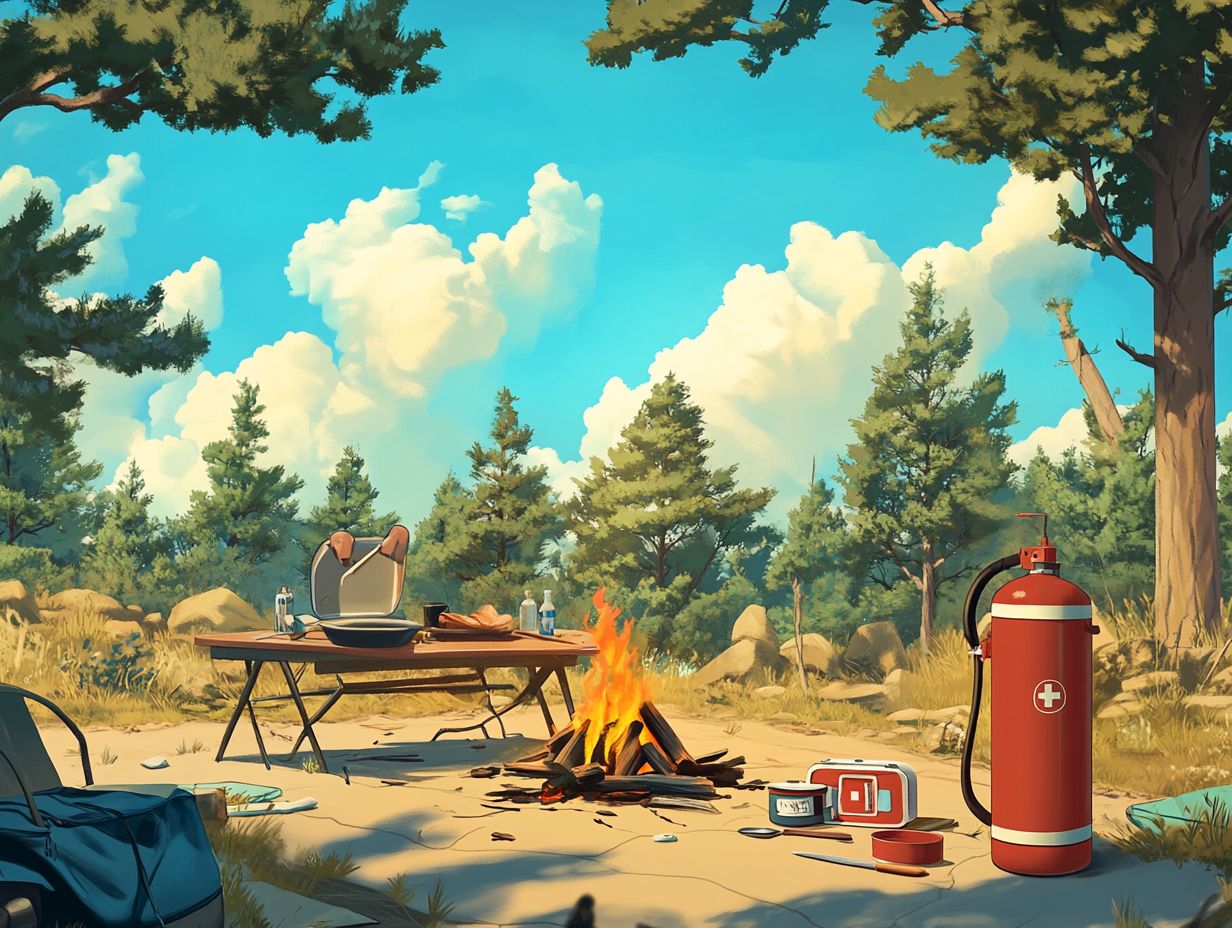
If an outdoor cooking accident happens, act quickly. This helps reduce injuries and speeds up healing.
For burns, cool the affected area with an ice pack to ease pain and limit skin damage. If the injury is a knife cut, apply Neosporin and a clean dressing to prevent infection. Keep a close watch on the wound.
Recognizing the signs of severe injury is critical. This helps you decide if a trip to the emergency room is necessary.
To ensure effective first aid, follow a step-by-step method. First, protect yourself and make sure the area is safe before assisting the injured person.
After cooling a burn, cover it loosely with a non-stick dressing to promote healing. If there s a cut, apply gentle pressure with a clean cloth to stop any bleeding.
Be on the lookout for increasing redness, swelling, or discharge. These could indicate an infection.
By being vigilant and informed, you can significantly influence recovery outcomes with quick response measures.
Preventing Outdoor Cooking Accidents
Preventing outdoor cooking accidents is essential for a safe and enjoyable experience for everyone. By following kitchen safety protocols and using effective prevention strategies, you can lower the risk of cooking mishaps.
For example, practice proper food handling and educate children about the hazards of sharp tools and hot surfaces.
Keeping a first aid kit handy and being aware of your surroundings can make a big difference while grilling or enjoying camp cooking.
Tips for Safe Outdoor Cooking
To keep your outdoor cooking safe and enjoyable, follow specific tips that enhance kitchen safety and reduce the risk of cooking accidents.
Implement safe grilling practices, like setting up designated cooking areas away from children and maintaining a tidy workspace.
Educating children about safety measures cultivates a fun and secure environment for everyone involved in the outdoor cooking experience.
For instance, set up the grill on a flat, stable surface and keep it at least 10 feet away from any flammable materials. Using a heavy-duty grill brush to keep the grates clean ensures better cooking results and reduces the risk of grease fires.
Encourage kids to get involved, perhaps by letting them wash vegetables or arrange condiments. As you explain the importance of fire safety, you add a delightful layer of fun. This not only imparts valuable lessons but also nurtures a sense of responsibility, turning outdoor cooking into a cherished family tradition.
Dealing with Burns and Other Injuries
Navigating burns and injuries in the kitchen requires a solid understanding of proper treatment protocols for effective healing.
It s essential to distinguish between the types of burns, whether it s a grease burn from cooking oil or a minor burn from a hot surface. Each type requires specific first aid steps.
Applying an ice pack to the affected area can help reduce swelling. Following up with Neosporin is key to preventing infection.
Understanding how to treat these injuries properly can significantly impact your recovery time and overall well-being.
Proper Treatment and Care
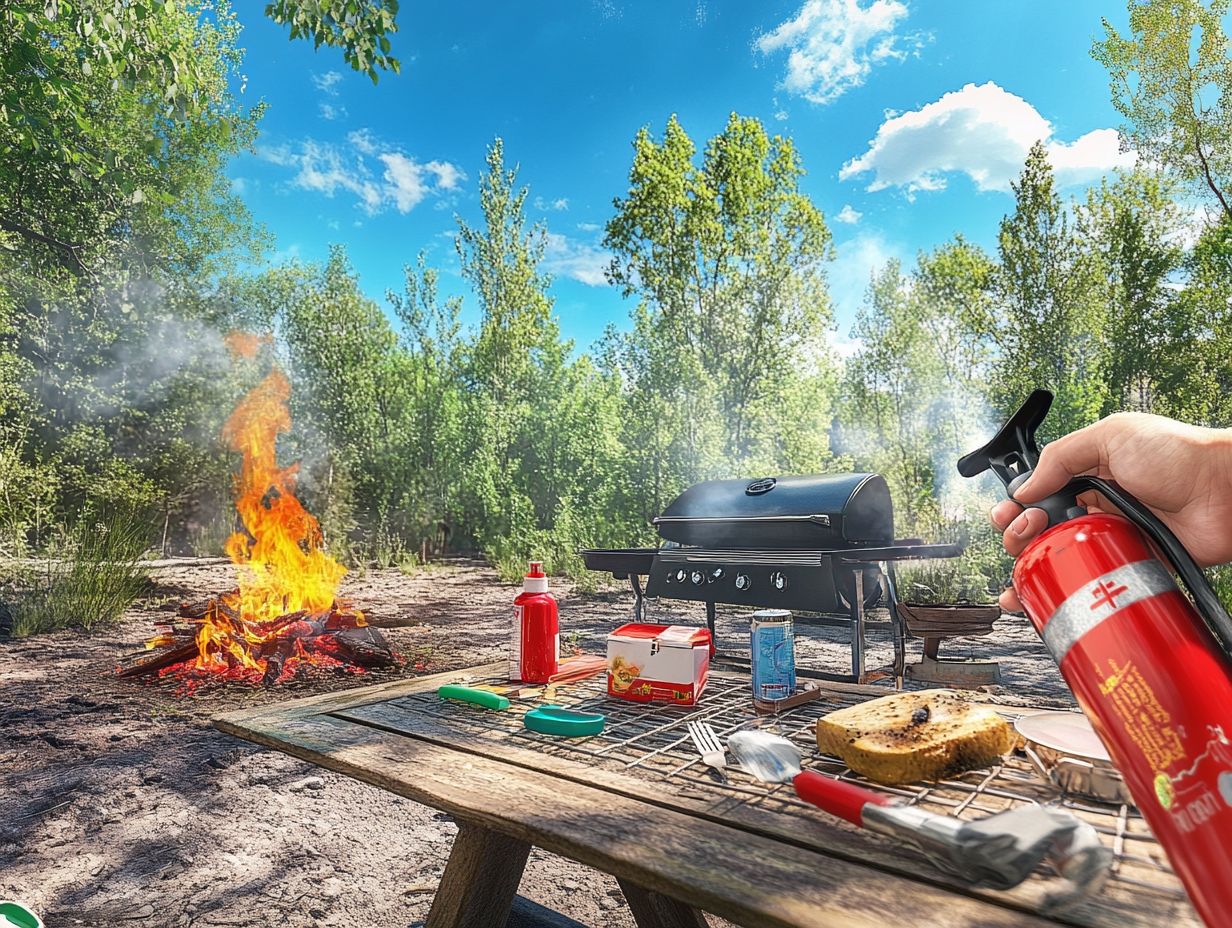
Proper treatment and care are essential for effectively addressing burns and kitchen injuries. This promotes optimal healing. For minor burns, applying an ice pack can alleviate pain and reduce swelling. Use Neosporin to prevent infection. When facing more serious injuries, such as deep cuts or severe burns, seek professional medical attention promptly to ensure proper care and recovery.
It’s vital to recognize the signs that indicate an injury requires immediate medical intervention. Excessive bleeding that doesn t stop after applying pressure or burns affecting a large area especially on the face, hands, or joints should not be overlooked.
For smaller cuts, gently clean the wound with soap and water before applying Neosporin. This can significantly help in preventing infections. Ice packs can also be your best friend, especially for bruises or strains, as they soothe pain when used intermittently.
Always keep in mind that the sooner injuries are treated properly, the better the healing process will be.
When to Seek Medical Attention
Understanding when to seek medical attention is vital for effectively managing outdoor cooking accidents and injuries. If you encounter serious signs like deep cuts, severe burns, or indications of infection it s important to head to the emergency room.
If a wound is deep or contaminated and your last tetanus shot (a vaccine that prevents serious bacterial infection) was over five years ago, consult a healthcare professional for proper evaluation and treatment. Your well-being should always be a priority.
Signs of Serious Injury
Recognizing the signs of a serious injury is vital for ensuring timely medical intervention and avoiding potential complications. Symptoms like excessive bleeding, severe pain, or persistent swelling after kitchen mishaps, such as burns or cuts, should never be taken lightly.
For example, a seemingly minor cut could escalate into a significant issue if it shows signs of infection, such as redness, warmth, or pus. Imagine this scenario: a home cook slices their hand while preparing dinner and initially dismisses the pain, only to later find themselves grappling with throbbing and swelling. Ignoring the situation promptly leads to a deep infection that demands extensive medical treatment.
If you suffer a head injury from a fall, be vigilant for signs of confusion or nausea, as these may indicate a concussion. Overlooking these symptoms could result in long-term health complications, underscoring the importance of remaining alert and taking swift action in potentially serious situations.
Frequently Asked Questions
What should I do if I accidentally start a fire while cooking outdoors?
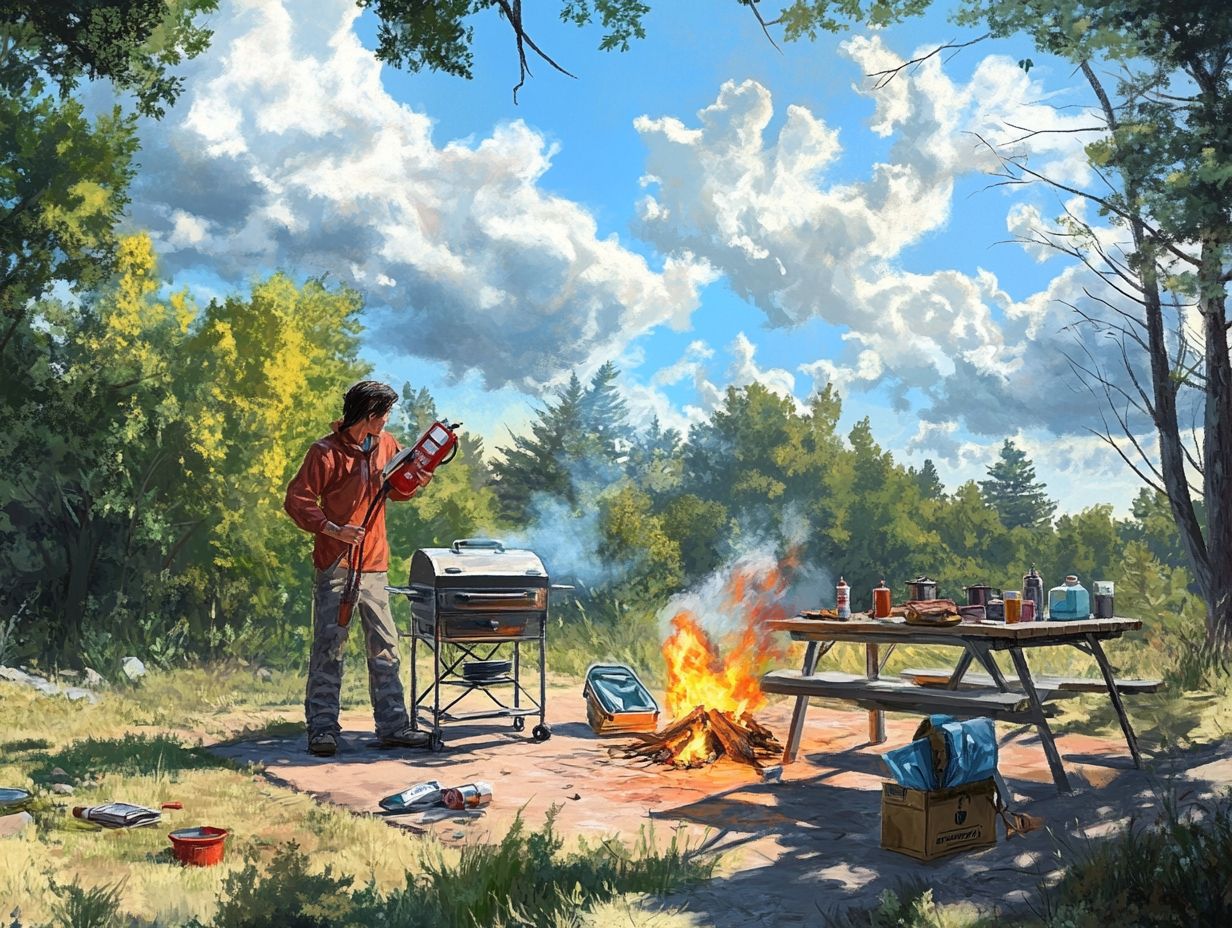
If a fire starts while you are cooking outdoors, the first thing you should do is remain calm. Then, try to smother the flames by covering them with a lid or using a fire extinguisher. If the fire is too big to handle, call the fire department immediately.
What safety precautions should I take when cooking outdoors?
Before starting any outdoor cooking, make sure to properly clean and maintain your grill or cooking equipment. Always have a fire extinguisher nearby and keep a safe distance from the grill while it is lit. Finally, never leave the cooking area unattended.
What should I do if someone gets burned while cooking outdoors?
Immediately remove the burned person from the heat source and run the affected area under cool water for at least 10 minutes. If the burn is severe, seek medical attention right away. Don’t hesitate to call for help if needed!
How can I prevent accidents while cooking outdoors?
One of the best ways to prevent accidents while cooking outdoors is to be prepared. Make sure to have all necessary tools and equipment ready, and follow safety guidelines for your specific cooking method. It is important to have a designated cooking area and keep any flammable materials away from the heat source.
What are common symptoms of heat exhaustion?
Watch for signs of heat exhaustion, including heavy sweating, weakness, and dizziness. If you experience these symptoms, seek a cool place to rest and hydrate.
What should I do if I run out of propane while cooking outdoors?
If you run out of propane while cooking outdoors, turn off the heat source and let it cool down. Always keep an extra tank handy for emergencies!
What should I do if I accidentally cut myself while cooking outdoors?
If you cut yourself, stop cooking immediately. Clean and bandage the wound right away.
If the cut is deep or bleeding doesn t stop, go to a hospital for help.

